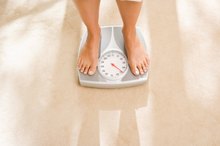How to Use Your BMR to Lose Weight
**When it comes right down to it, weight loss is all about calories.
** Knowing the number of calories your body burns to perform daily functions, which is referred to as the basal metabolic rate, or BMR, can help you determine the number of calories you need to lose weight. Consult your doctor before making any changes to your diet.
What is the BMR
BMR is the number of calories your body needs for basic body functions that keep you alive, such as your heartbeat, breathing and the regular upkeep of your body organs; it's essentially the number of calories you need if you did nothing but lie around all day.
Surprisingly, BMR makes up the bulk of your calorie needs -- about 60 percent of your total energy expenditure, according to the University of Colorado at Denver -- with the calories you use to metabolize food and calories burned through activity and exercise making up the rest. Your muscles are your body's biggest BMR calorie burner. That's why men, who typically have more muscle on their frames, have higher BMRs than women. If you're trying to lose weight, knowing your BMR can help you better estimate your calorie needs for weight loss.
- BMR is the number of calories your body needs for basic body functions that keep you alive, such as your heartbeat, breathing and the regular upkeep of your body organs; it's essentially the number of calories you need if you did nothing but lie around all day.
- Surprisingly, BMR makes up the bulk of your calorie needs -- about 60 percent of your total energy expenditure, according to the University of Colorado at Denver -- with the calories you use to metabolize food and calories burned through activity and exercise making up the rest.
Determine Your BMR
What Is the Average Caloric Intake for a 30-Year-Old Man?
Learn More
A number of formulas are used to estimate BMR. According to a 2005 review study published in the Journal of the American Dietetic Association, the Mifflin-St. Jeor equation is the most accurate at estimating calorie needs in both non-obese and obese individuals 1.
The Mifflin-St. Jeor equation is different for men and women. You'll need your height, weight and age to do the calculations.
Divide your weight in pounds by 2.2 to get kilograms. To calculate your height in centimeters, multiply the inches by 2.54.
For men: BMR = (9.99 x weight in kilograms) + (6.25 x height in centimeters) - 4.92 x age in years + 5.
For women: BMR = (9.99 x weight in kilograms) + (6.25 x height in centimeters) - (4.92 x age in years) - 161. For example, a 41-year-old female who weighs 162 pounds at 5-foot, 4-inches tall has a BMR of 1,388 calories.
While predictive equations provide a baseline for estimating calories, metabolic rates vary due to genetics and muscle mass.
- A number of formulas are used to estimate BMR.
- For women: BMR = (9.99 x weight in kilograms) + (6.25 x height in centimeters) - (4.92 x age in years) - 161.
Using BMR to Determine Your Calorie Goal
Eating fewer calories than your body needs to function will result in weight loss.
To lose 1 pound a week, reduce your daily intake by 500 calories. While the BMR provides the number of calories your body uses for basic functions, the other factors that affect calorie needs, including activity and the thermic effect of food, also account for part of your total calorie needs.
To calculate the calories you need to maintain your current weight, multiply your BMR by an activity factor. If you do not exercise and have a desk job, your activity factor is 1.2.
If you exercise one to three days a week, your activity factor is 1.375.
**If you exercise three to five days a week, your activity factor is 1.55.
** If you're involved in sports and exercise six to seven days a week, your activity factor is 1.725. If you're training for a marathon or have a physically demanding job, your activity factor is 1.9.
So, for example, a 41-year-old woman with a BMR of 1,388 calories who exercises three days a week needs 1,909 calories to maintain her weight: 1,388 x 1.375 = 1,909. Subtract 500 calories, and she needs 1,409 calories to lose 1 pound a week.
However, women should not eat fewer than 1,200 calories a day, and men should not eat fewer than 1,800 calories a day, according to the American College of Sports Medicine. If subtracting 500 calories puts you below those numbers, you'll need to cut fewer calories from your diet and exercise more to burn the rest.
- Eating fewer calories than your body needs to function will result in weight loss.
- If you're training for a marathon or have a physically demanding job, your activity factor is 1.9.
Changing Your BMR for Weight Loss
How to Calculate EER
Learn More
Your BMR decreases as you lose weight, which means you need to eat even less as your weight goes down to continue to drop pounds. Loss of muscle may be partly responsible for some of the decrease in your BMR.
**You may be able to offset some of the changes in your BMR with strength-training exercises to build muscle.
** Work out your muscles two to three days a week using free weights, resistance bands or body resistance exercises such as squats, sit-ups and push-ups. If you're not sure where to begin, consult a fitness professional to help design an individualized exercise plan for you.
- Your BMR decreases as you lose weight, which means you need to eat even less as your weight goes down to continue to drop pounds.
- You may be able to offset some of the changes in your BMR with strength-training exercises to build muscle.
Related Articles
References
- Journal of the American Dietetic Association: Comparison of Predictive Equations for Resting Metabolic Rate in Healthy Nonobese and Obese Adults: A Systematic Review.
- Centers for Disease Control and Prevention: How Much Physical Activity Do Adults Need?
- American Council on Exercise: Resting Metabolic Rate: Best Ways to Measure It - And Raise It, Too
- A new predictive equation for resting energy expenditure in healthy individuals - PubMed
- Estimation of energy expenditure using prediction equations in overweight and obese adults: a systematic review - PubMed
- Validity of predictive equations to estimate RMR in females with varying BMI - PubMed
- Appendix 2. Estimated Calorie Needs per Day, by Age, Sex, and Physical Activity Level - 2015-2020 Dietary Guidelines | health.gov
- Protein intake and energy balance - PubMed
- Increased Dietary Protein as a Dietary Strategy to Prevent and/or Treat Obesity
- Effect of protein overfeeding on energy expenditure measured in a metabolic chamber - PubMed
- Dietary Protein and Energy Balance in Relation to Obesity and Co-morbidities - PubMed
- Effect of protein overfeeding on energy expenditure measured in a metabolic chamber - PubMed
- Presence or absence of carbohydrates and the proportion of fat in a high-protein diet affect appetite suppression but not energy expenditure in normal-weight human subjects fed in energy balance - PubMed
- Gluconeogenesis and energy expenditure after a high-protein, carbohydrate-free diet - PubMed
- A high-protein diet for reducing body fat: mechanisms and possible caveats
- A high-protein diet induces sustained reductions in appetite, ad libitum caloric intake, and body weight despite compensatory changes in diurnal plasma leptin and ghrelin concentrations - PubMed
- The effects of consuming frequent, higher protein meals on appetite and satiety during weight loss in overweight/obese men - PubMed
- Dietary Strategies for Weight Loss Maintenance - PubMed
- Dietary protein - its role in satiety, energetics, weight loss and health - PubMed
- High Compared with Moderate Protein Intake Reduces Adaptive Thermogenesis and Induces a Negative Energy Balance during Long-term Weight-Loss Maintenance in Participants with Prediabetes in the Postobese State: A PREVIEW Study - PubMed
- Effects of food form and timing of ingestion on appetite and energy intake in lean young adults and in young adults with obesity - PubMed
- Effects of fruit and vegetable, consumed in solid vs beverage forms, on acute and chronic appetitive responses in lean and obese adults - PubMed
- Sugar-sweetened beverages and weight gain in children and adults: a systematic review and meta-analysis - PubMed
- Resolved: there is sufficient scientific evidence that decreasing sugar-sweetened beverage consumption will reduce the prevalence of obesity and obesity-related diseases - PubMed
- Adverse metabolic effects of dietary fructose: results from the recent epidemiological, clinical, and mechanistic studies - PubMed
- Water-induced thermogenesis - PubMed
- Water drinking induces thermogenesis through osmosensitive mechanisms - PubMed
- Water-induced thermogenesis and fat oxidation: a reassessment - PubMed
- Immediate pre-meal water ingestion decreases voluntary food intake in lean young males - PubMed
- Water consumption increases weight loss during a hypocaloric diet intervention in middle-aged and older adults - PubMed
- Tea catechin and caffeine activate brown adipose tissue and increase cold-induced thermogenic capacity in humans - PubMed
- Caffeine enhances activity thermogenesis and energy expenditure in rats - PubMed
- The effects of caffeine intake on weight loss: a systematic review and dos-response meta-analysis of randomized controlled trials - PubMed
- Caffeine intake is related to successful weight loss maintenance - PubMed
- Preserving Healthy Muscle during Weight Loss
- Exercise acts as a drug; the pharmacological benefits of exercise - PubMed
- The essential role of exercise in the management of type 2 diabetes - PubMed
- A Systematic Review of Exercise Systematic Reviews in the Cancer Literature (2005-2017) - PubMed
- Benefits of exercise training on cardiovascular dysfunction: molecular and integrative - PubMed
- Exercise in the treatment of clinical anxiety in general practice - a systematic review and meta-analysis - PubMed
- The effects of a low-carbohydrate diet on appetite: A randomized controlled trial - PubMed
- Effects of low-carbohydrate and low-fat diets: a randomized trial - PubMed
- Effects of low-carbohydrate and low-fat diets: a randomized trial - PubMed
- Dietary Intervention for Overweight and Obese Adults: Comparison of Low-Carbohydrate and Low-Fat Diets. A Meta-Analysis - PubMed
- The Effects of a Low-Carbohydrate Diet vs. a Low-Fat Diet on Novel Cardiovascular Risk Factors: A Randomized Controlled Trial
- The Effect of Low-Carbohydrate Diet on Glycemic Control in Patients with Type 2 Diabetes Mellitus - PubMed
Writer Bio
Jill Corleone is a registered dietitian and health coach who has been writing and lecturing on diet and health for more than 15 years. Her work has been featured on the Huffington Post, Diabetes Self-Management and in the book "Noninvasive Mechanical Ventilation," edited by John R. Bach, M.D. Corleone holds a Bachelor of Science in nutrition.









